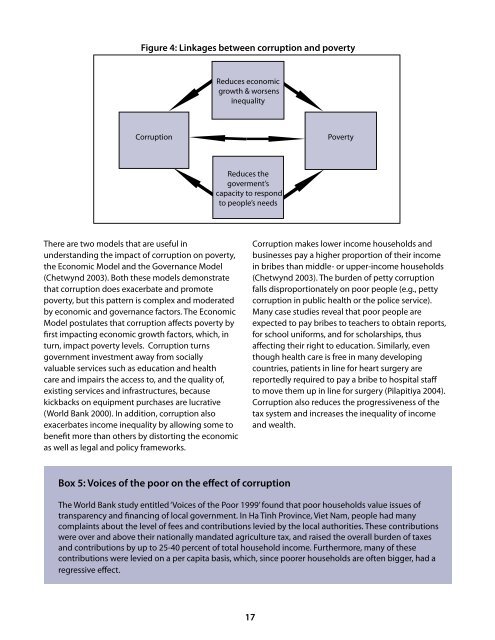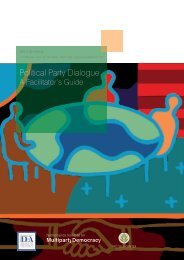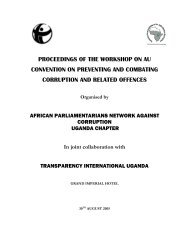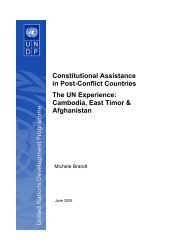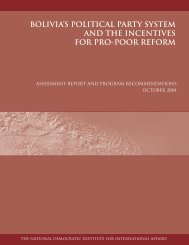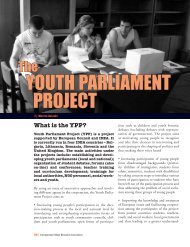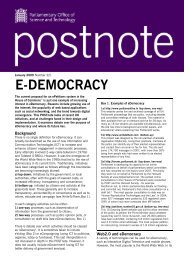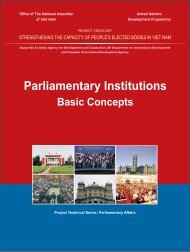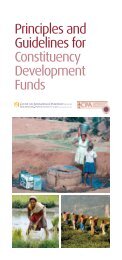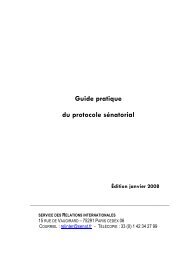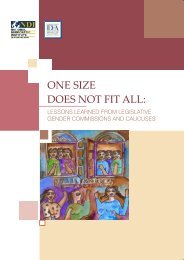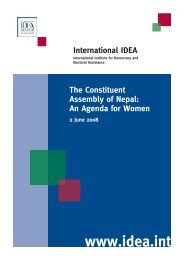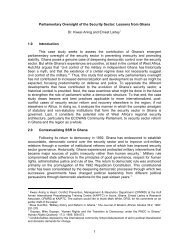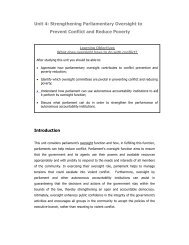Corruption and Development - pogar
Corruption and Development - pogar
Corruption and Development - pogar
Create successful ePaper yourself
Turn your PDF publications into a flip-book with our unique Google optimized e-Paper software.
Figure 4: Linkages between corruption <strong>and</strong> poverty<br />
Reduces economic<br />
growth & worsens<br />
inequality<br />
<strong>Corruption</strong><br />
Poverty<br />
Reduces the<br />
goverment’s<br />
capacity to respond<br />
to people’s needs<br />
There are two models that are useful in<br />
underst<strong>and</strong>ing the impact of corruption on poverty,<br />
the Economic Model <strong>and</strong> the Governance Model<br />
(Chetwynd 2003). Both these models demonstrate<br />
that corruption does exacerbate <strong>and</strong> promote<br />
poverty, but this pattern is complex <strong>and</strong> moderated<br />
by economic <strong>and</strong> governance factors. The Economic<br />
Model postulates that corruption affects poverty by<br />
first impacting economic growth factors, which, in<br />
turn, impact poverty levels. <strong>Corruption</strong> turns<br />
government investment away from socially<br />
valuable services such as education <strong>and</strong> health<br />
care <strong>and</strong> impairs the access to, <strong>and</strong> the quality of,<br />
existing services <strong>and</strong> infrastructures, because<br />
kickbacks on equipment purchases are lucrative<br />
(World Bank 2000). In addition, corruption also<br />
exacerbates income inequality by allowing some to<br />
benefit more than others by distorting the economic<br />
as well as legal <strong>and</strong> policy frameworks.<br />
<strong>Corruption</strong> makes lower income households <strong>and</strong><br />
businesses pay a higher proportion of their income<br />
in bribes than middle- or upper-income households<br />
(Chetwynd 2003). The burden of petty corruption<br />
falls disproportionately on poor people (e.g., petty<br />
corruption in public health or the police service).<br />
Many case studies reveal that poor people are<br />
expected to pay bribes to teachers to obtain reports,<br />
for school uniforms, <strong>and</strong> for scholarships, thus<br />
affecting their right to education. Similarly, even<br />
though health care is free in many developing<br />
countries, patients in line for heart surgery are<br />
reportedly required to pay a bribe to hospital staff<br />
to move them up in line for surgery (Pilapitiya 2004).<br />
<strong>Corruption</strong> also reduces the progressiveness of the<br />
tax system <strong>and</strong> increases the inequality of income<br />
<strong>and</strong> wealth.<br />
Box 5: Voices of the poor on the effect of corruption<br />
The World Bank study entitled ‘Voices of the Poor 1999’ found that poor households value issues of<br />
transparency <strong>and</strong> financing of local government. In Ha Tinh Province, Viet Nam, people had many<br />
complaints about the level of fees <strong>and</strong> contributions levied by the local authorities. These contributions<br />
were over <strong>and</strong> above their nationally m<strong>and</strong>ated agriculture tax, <strong>and</strong> raised the overall burden of taxes<br />
<strong>and</strong> contributions by up to 25-40 percent of total household income. Furthermore, many of these<br />
contributions were levied on a per capita basis, which, since poorer households are often bigger, had a<br />
regressive effect.<br />
17


